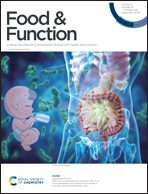Gastric lipase can significantly increase lipolysis and carotenoid bioaccessibility from plant food matrices in the harmonized INFOGEST static in vitro digestion model
Abstract
Gastrointestinal digestion of carotenoids has received much attention, as these lipophilic compounds have been related to several health benefits. Most commonly, static digestion models such as the consensus INFOGEST model are employed to study their bioaccessibility from test matrices. However, an aspect that has been much neglected is the use of gastric lipase. Its inclusion to gastro-intestinal (GI) digestion is expected to foster emulsification of lipophilic constituents prior to their incorporation into mixed micelles. In this study, we compared the effect of various lipases from R. niveus, R. oryzae, and rabbit gastric extracts (RGE), at different concentrations (0, 30, and 60 U mL−1), on carotenoid bioaccessibility from several food matrices (tomato juice, spinach, and carrot juice). We also investigated whether co-digestion of pure proteins (whey and soy protein isolates) at 0, 25, and 50% of the equivalent recommended dietary allowance, would interact with carotenoid bioaccessibility in presence or absence of RGE. Lipolysis was also studied. Considering all matrices combined, lipases significantly improved the bioaccessibility of carotenoids (p < 0.001). Compared to other lipases, RGE consistently increased carotenoid bioaccessibility in all tested matrices, by up to 182% (p < 0.001), this effect was partly maintained in the presence of co-digested proteins. Unexpectedly, all 3 lipases improved gastric lipolysis in all matrices, by an average of 10-fold (p < 0.001). In conclusion, only RGE contributed significantly to improving both lipolysis extent and carotenoid bioaccessibility in all tested matrices, while the presence of proteins mitigated the positive effect of lipases on carotenoid bioaccessibility.



 Please wait while we load your content...
Please wait while we load your content...